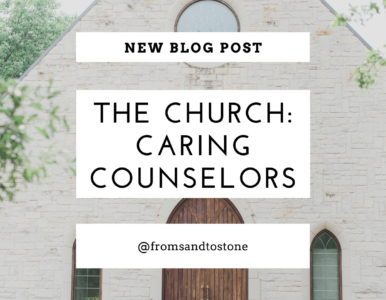Counseling sounds like one of those elusive scary things that only the highly specialized can ever do. I’m here to say though, that you can counsel too, in fact our churches should be much more full of counselors than they are.
I know full well how long it takes to be licensed to counsel in the secular world, two degrees and several more supervised years before you get to be a professional. And boy do we want to make sure people know it, I remember how much contempt fellow professionals had for those practicing social work with a different degree – like somehow our specific education made us better at changing society and caring for others than anyone else.
Now I watch as perfectly capable people are convinced that they can’t help anyone through their problems because they don’t have the right degree. I’ve heard pastors referring people to secular counselors because they don’t think they have the skills to counsel people. But I’ve also seen people who have stepped forward in faith, took time to learn skills to make them better counselors, learned how to apply scripture, and practiced being comfortable sitting down with people to help them work through a variety of issues.
It’s time for the church to take care back. It’s time for us to stop just preaching the sufficiency and authority of scripture on Sundays and then send people with problems away to secular solutions. Scripture speaks to all of humans: body, mind, and spirit. Scripture speaks to all aspects of life and should be offered as a solution to people in their sin and suffering. Scripture transforms our thoughts, feelings and actions.
There’s much that couple be said on the topic, more than one blog post can cover, but here’s four summarized concepts that help support the idea that we should be a church of counselors.
Called to Care
3 Praise be to the God and Father of our Lord Jesus Christ, the Father of compassion and the God of all comfort, 4 who comforts us in all our troubles, so that we can comfort those in any trouble with the comfort we ourselves receive from God. 5 For just as we share abundantly in the sufferings of Christ, so also our comfort abounds through Christ.
2 Corinthians 1:3-5
2 Carry each other’s burdens, and in this way you will fulfill the law of Christ.
Galatians 6:2
As Christians, we don’t live in a vacuum. We live in relationship with other humans and are to genuinely care about other people’s burdens. The Gospel of John also tells us that the world will know us by our love for each other. This means when we are in relationship with someone and they are going through suffering, emotional troubles, financial troubles, whatever it is – we stay by their side and don’t send their problems off to someone else to solve. Christians should be leading the way in showing what love and care for each other is. Even if you need to refer someone to a trained counselor, don’t stop checking in on people.
Sufficiency of Scripture
3 His divine power has given us everything we need for a godly life through our knowledge of him who called us by his own glory and goodness.
2 Peter 1:3
20 Above all, you must understand that no prophecy of Scripture came about by the prophet’s own interpretation of things. 21 For prophecy never had its origin in the human will, but prophets, though human, spoke from God as they were carried along by the Holy Spirit.
2 Peter 20-21
What we believe about God and His inspired scriptures will determine how we approach life. Do you fully believe that the Gospel message can transform all our lives and creation (Colossians 1) or do we have areas that we consciously or unconsciously don’t believe the Gospel can touch and transform? The thing is, God equipped us with his word of truth and everything we need to transform every aspect of life and we need to bring this into counseling and caring for others. Think about this, our Christian worldview tells us God overcame every power, has all authority, created the world, will redeem our world, gives us eternal life, is transforming all creation through the peace Jesus made on the cross, has made us a new creation, is renewing our minds, and has equipped us with the truth for transformation. There is no secular worldview or counseling theory that encompasses or addresses the depths and complexities of human life (the heart and mind) like the Christian worldview.
Levels of Counseling
24 Moses listened to his father-in-law and did everything he said. 25 He chose capable men from all Israel and made them leaders of the people, officials over thousands, hundreds, fifties and tens. 26 They served as judges for the people at all times. The difficult cases they brought to Moses, but the simple ones they decided themselves.
Exodus 18:24-26
We’ve spent a brief amount of time establishing that we are called to care for each other, and that Scripture gives us answers for all of life and therefor is more sufficient than secular counseling theories. However much I believe that Scripture speaks to all of human life and we should make it our primary source for caring for others and speaking it’s life to those we’re caring / counseling … we have to acknowledge that we aren’t may not have all the skills or knowledge day one to handle complex emotional or mental health issues. We need to apply the Jethro principal here. There are trained Biblical Counselors and Pastors who have studied human behavior, the brain, and have a very deep knowledge of Scripture – let them handle the most difficult cases of extreme emotional, behavioral, and mental health issues. If your church has community has practiced pastors, deacons, laymen that are grounded in scripture and lots of practice, let them handle slightly complex and ongoing counseling needs. But if your friend or family member needs advice, is struggling with some anxiety or depression, is contemplating divorce, needs help with a conflict, etc and they are issues that your knowledge of Scripture can speak to, be there for them to speak truth. If you don’t feel equipped, find someone with more practice or experience to help you or model Biblical care conversations or find some books on this subject. Being a Church of Counselors means everyone must participate, but it only works well if you handle the needs you can and then refer up to those who can handle more complex needs. Right now, Christian / Biblical Counselors are swamped and at max caseloads, you can help free them up for those with the highest needs by helping those you’re in relationship with to the level your comfortable with and as you get more confident is using Scripture to counsel, you will find you can help with bigger and bigger issues.
Holy Spirit
26 But the Advocate, the Holy Spirit, whom the Father will send in my name, will teach you all things and will remind you of everything I have said to you.
John 14:26
16 So from now on we regard no one from a worldly point of view. Though we once regarded Christ in this way, we do so no longer. 17 Therefore, if anyone is in Christ, the new creation has come: The old has gone, the new is here! 18 All this is from God, who reconciled us to himself through Christ and gave us the ministry of reconciliation
2 Corinthians 15:16-18
for our gospel did not come to you in word only, but also in power and in the Holy Spirit and with full conviction; just as you know what kind of men we proved to be among you for your sake.
1 Thessalonians 1:5
Last but most importantly, we have something that the world doesn’t have. The Holy Spirit. When you send someone to a secular counselor for help instead of someone biblically grounded or help them yourself, they don’t have the most important element necessary to helping transform their life. The Spirit is what God gave us to share is truth, knowledge, power, and transformation in us and we desperately need this in counseling. Many theories exist to help people change themselves, but nothing is as successful as drawing on the power of God to change us. All other theories of change hold nothing compared to the change the Spirit produces in us. Scripture tells us we were dead but are now alive, that’s power I want to use for people who are hurting, distraught, suffering, anxious, depressed, etc.
Again, there is so much more to be said on this topic, but I hope in some way it has challenged you to think about your willingness to step into the messiness of people’s problems and offer care to them based on Scripture or to look for people to refer them to that will take a Biblical approach. There are great resources and places to go to learn more about skills and ways to really counsel people. For now, I hope you understand that God speaks to all areas of our life and we can’t exclude Him from counseling others and indeed we are called to counsel others, even if it means starting small.


